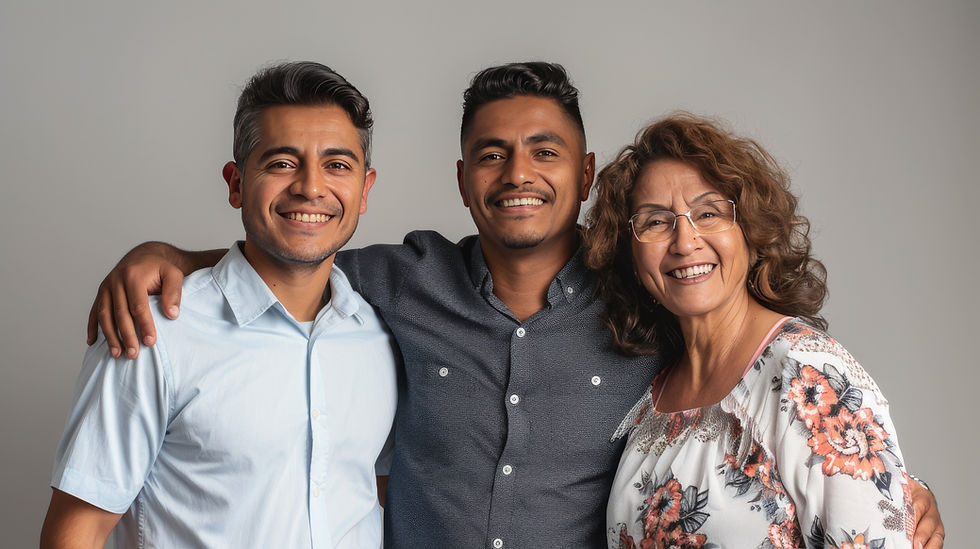National Hispanic Heritage Month: Why Representation in Clinical Research Matters
- Tamara Allen
- Sep 26, 2024
- 5 min read
Updated: Dec 2, 2024

National Hispanic Heritage Month, celebrated from September 15 to October 15, honors the heritage, culture, and contributions of Hispanic and Latino communities in the United States. This year’s theme, "Pioneers of Change: Shaping the Future Together," highlights the progress made by these communities and reminds us of the collective effort needed to address ongoing disparities, particularly in healthcare.
At PEP!IN (People Empowering People for Inclusion Now) is dedicated to building an equitable future, especially within clinical research. Hispanic and Latino individuals make up 19% of the U.S. population yet only represent 11% of clinical trial participants. We’ve developed the EMBRACE methodology to address this disparity, a framework designed to help clinical research sponsors and community partners create more inclusive, accessible, and culturally relevant trials. Although we are new to the industry in name, we are not new to the industry in practice. Our methodology outlines how we aim to help clients achieve better representation in clinical research.
Why Representation in Clinical Trials is Critical
Clinical trials are essential for advancing medical treatments, but the underrepresentation of Hispanic/Latino populations has significant consequences. Cancer is the leading cause of death among Hispanics, and while this group faces increased risks for specific cancers like liver, gastric, and cervical cancers, less than 10% of participants in cancer trials are Latino. This underrepresentation limits the effectiveness of treatments for these populations, perpetuating health disparities.
At PEP!IN, we recognize that diverse participation in clinical trials leads to more personalized and effective healthcare. Our goal is to help future clients and partners design trials and other research opportunities that include all populations, ensuring that treatments are tailored to the communities most in need.
Barriers to Participation for Hispanic/Latino Communities
Several barriers contribute to the low participation of Hispanic and Latino individuals in clinical trials. These include:
Lack of awareness about clinical research and its benefits.
Mistrust of the medical system due to historical and systemic inequities, exacerbated by a lack of diversity in research teams, which can hinder culturally competent engagement.
Language barriers, making it difficult for participants to fully understand trial requirements, protocols, and risks.
Financial and logistical challenges, such as lack of transportation or insurance, worsened by limited decentralized trial options, which often require travel to central locations.
Rigid study protocols, which fail to accommodate the cultural, social, and logistical needs of diverse communities, making participation difficult.
Cultural differences in communication, leading to misunderstandings about the clinical trial process and expectations.
PEP!IN’s EMBRACE methodology is designed to address these barriers by working with clients to create culturally competent and community-driven strategies that engage and empower Hispanic/Latino communities.

Introducing the EMBRACE Methodology
PEP!IN’s EMBRACE methodology is a comprehensive framework designed to guide clinical trial sponsors and community partners in creating more inclusive research. EMBRACE stands for Empowerment, Mobilization, Bridging Gaps, Retention, Adaptation, Community Focus, and Equity.
Empowerment: We work with our partners to empower communities by involving them in the research process. This means listening to their concerns, addressing their needs, and creating an environment where they feel their participation matters.
Mobilization: Mobilizing resources and partnerships is essential for effective outreach. PEP!IN aims to connect clients with local leaders and organizations to help spread awareness and build trust within Hispanic/Latino communities.
Bridging Gaps: We focus on bridging the gaps in communication, language, and access that prevent people from participating in clinical trials. By providing bilingual materials and culturally relevant outreach, we help make clinical trials more accessible.
Retention: Retaining participants throughout the trial process is just as important as recruiting them. PEP!IN will help sponsors create retention strategies that provide ongoing support, such as transportation, financial aid, and regular check-ins.
Adaptation: Clinical trials should adapt to the needs of the communities they serve. PEP!IN will work with clients to ensure that trial designs are flexible and responsive to participants' cultural, linguistic, and logistical needs.
Community Focus: A focus on community is central to our approach. By partnering with community organizations and leaders, we aim to create clinical trials that are rooted in the values and priorities of the communities they serve.
Equity: Equity is the foundation of everything we do. PEP!IN is committed to ensuring that clinical trials are designed and conducted in a way that addresses health disparities and provides equal access to healthcare advancements for all populations.
Promising Strategies to Increase Latino Participation in Clinical Research
Research has shown that certain strategies are particularly effective in increasing Latino participation in clinical trials. A targeted literature review published in the Journal of Health Care for the Poor and Underserved identified several key facilitators, including:
Building trust between research staff and participants by fostering long-term relationships.
Incorporating familism, a cultural value that emphasizes family involvement in decision-making.
Using bilingual and culturally competent staff to eliminate language barriers and ensure participants feel understood.
Continuous engagement, not just during recruitment but throughout the entire research process, to build lasting relationships with participants.
At PEP!IN, we are committed to helping clients implement these strategies through our EMBRACE methodology. We aim to create research processes that reflect the needs and values of Hispanic/Latino communities, helping to bridge the gap in representation.
Call to Action: Shaping the Future Together
PEP!IN’s vision is to help create a future where clinical trials are truly representative of the diverse populations they serve. We believe that collaboration between pharmaceutical companies, CROs, policymakers, and community organizations is critical to achieving this goal.
For Healthcare and Research Partners: We invite you to collaborate with us to develop recruitment strategies that address the barriers faced by underrepresented communities, including Hispanic/Latino individuals. Together, we can create more inclusive and effective clinical trials.
For Community Leaders and Potential Participants: Learn more about how you can support or participate in clinical trials that could benefit your community and future generations. PEP!IN is here to help create a pathway to more equitable healthcare solutions.
Let’s work together to shape a more inclusive and equitable future for clinical research. To learn more, or contact us at contact@wearepepin.com or complete the contact form on our website to start the conversation today.
References:
Dreyfus, B., Kuri, L., Ferri, M., et al. (2023). "Understanding Hispanic/Latino Participation in Clinical Trials and Observational Studies, and Strategies to Increase Participation: A Targeted Literature Review." Journal of Health Care for the Poor and Underserved, Volume 34, Number 1. Retrieved from JHU Press.
Espinoza-Gutarra, M., et al. (2022). "Hispanic/Latino Underrepresentation in Cancer Clinical Trials." JCO Oncology Practice, Volume 18, Number 5. DOI:10.1200/OP.22.00214.
"2020 Census Illuminates Racial and Ethnic Composition of the Country." United States Census Bureau, 2021. Link.
Miller KD, Ortiz AP, Pinheiro PS, et al: Cancer statistics for the US Hispanic/Latino population, 2021. CA Cancer J Clin, 71:466-487, 2021.
By The Numbers " Salud America!.
Disclaimer: The content provided on this website is for informational purposes only and is not intended as medical advice or a diagnosis, For more, read our full disclaimer.



Comments